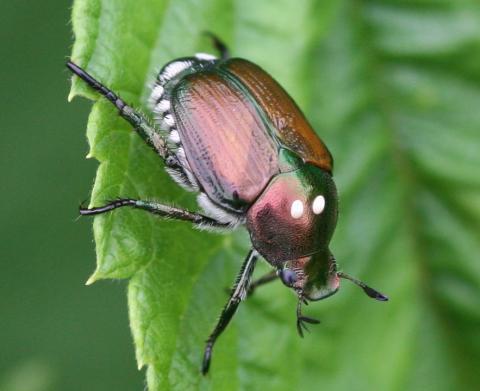How to Control Japanese Beetles in my Garden

Japanese beetles were introduced to the United States in the first part of the twentieth century. Since then they have become a major garden pest. Japanese beetles usually emerge in late spring and early summer. Although they only produce one generation per year in New Hampshire, Japanese beetles are active throughout the entire growing season, continuing to cause damage until frost in the fall.
If it weren’t for their destructive behavior, Japanese beetles could easily be considered beautiful. They are easily recognized by their metallic green bodies which are accented on either side by white tufts of hair and shiny bronze wing covers. When it comes to food, Japanese beetles are anything but picky. Adult Japanese beetles feed on over 400 plant species, including ornamentals, fruits, and vegetables.
In the home garden, one of the best control methods for Japanese beetles is handpicking. It is usually easier to handpick beetles in the morning and evening when the insects are less active. When handpicking, look to see if there are any white spots on the beetles’ backs. Tachinid flies lay white eggs on Japanese beetle adults. When those eggs hatch, the larva will bore its way into the beetle and eventually kill it. If you notice tachinid eggs, make sure to leave those Japanese beetles alone to help boost natural enemy populations.
A number of pesticides are registered for use on Japanese beetles, but their effectiveness is often limited. Plants must be sprayed repeatedly because Japanese beetles are very good fliers and will continually reinvade areas with preferred host plants. Many of the most effective insecticides are also very toxic to bees and should not be applied when bees are actively foraging.
One control method that should be avoided is using Japanese beetle pheromone traps. While these traps may attract and kill a large number of beetles, they can lure more to the garden than they catch. This can lead to increased damage to the plants surrounding the traps in the garden.
Got questions? The Ask UNH Extension Infoline offers practical help finding answers for your home, yard, and garden questions. Call toll free at 1-877-398-4769, Monday to Friday, 9 a.m. to 2 p.m., or e-mail us at answers@unh.edu.
Related Resource(s)
Do you love learning about stuff like this?
SUBSCRIBE TO Granite State Gardening newsletter
Got questions? The UNH Extension Yard and Garden Infoline offers practical help finding answers for your yard and garden questions.
Call toll free at 1-877-398-4769, Monday to Friday, 9 a.m. to 2 p.m., or fill out webform.
